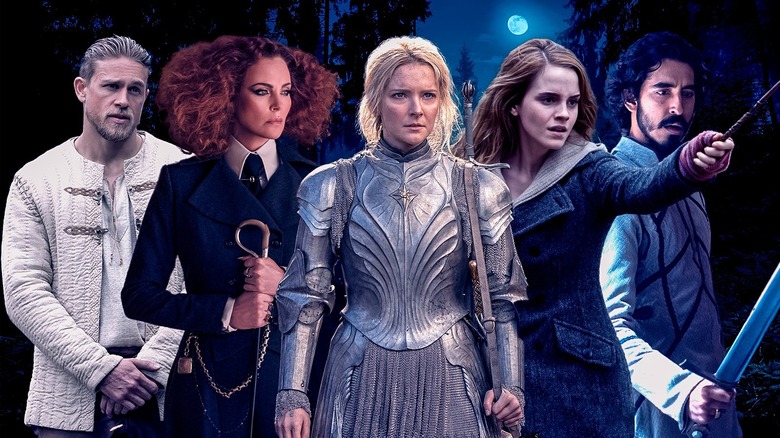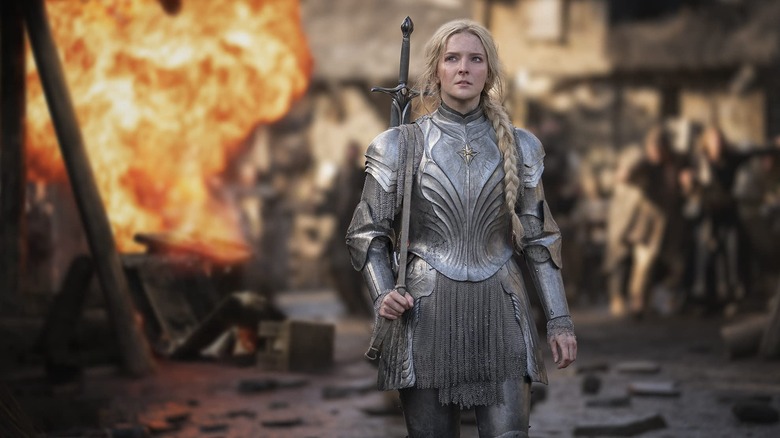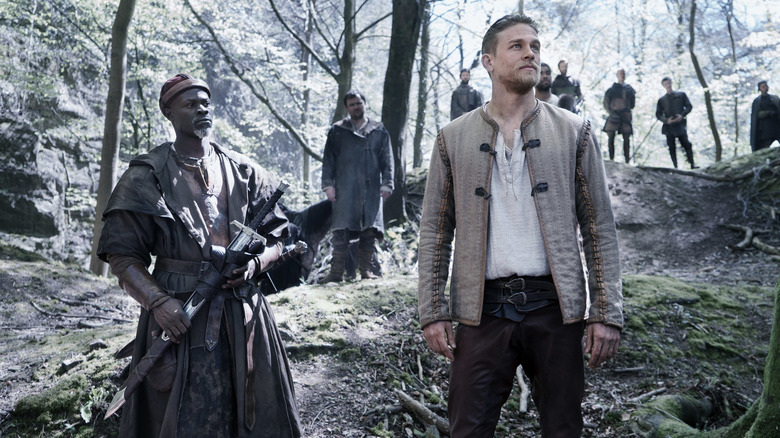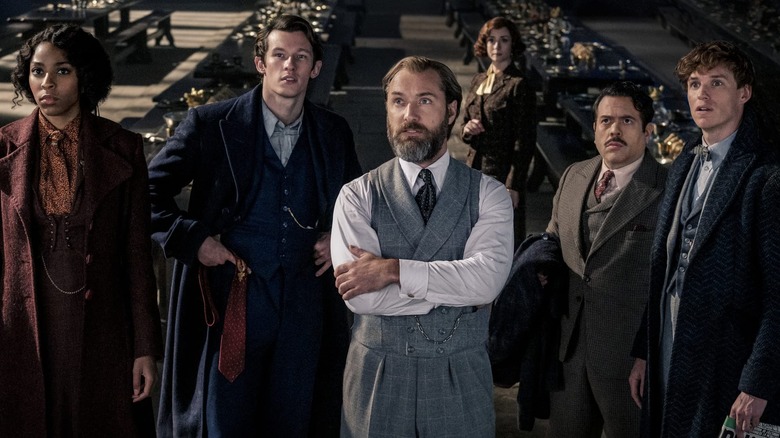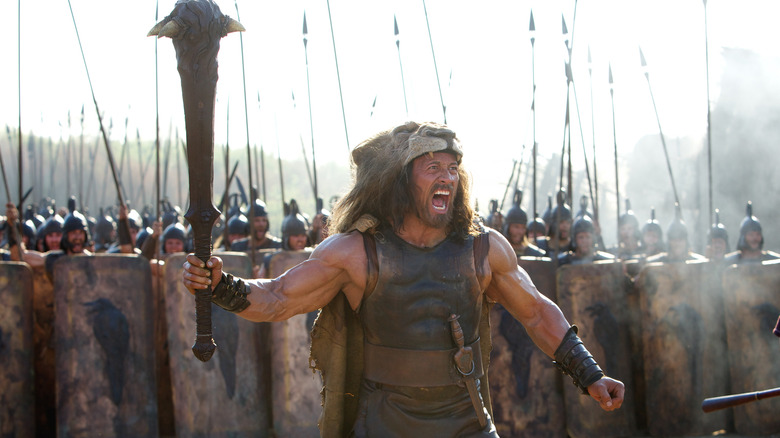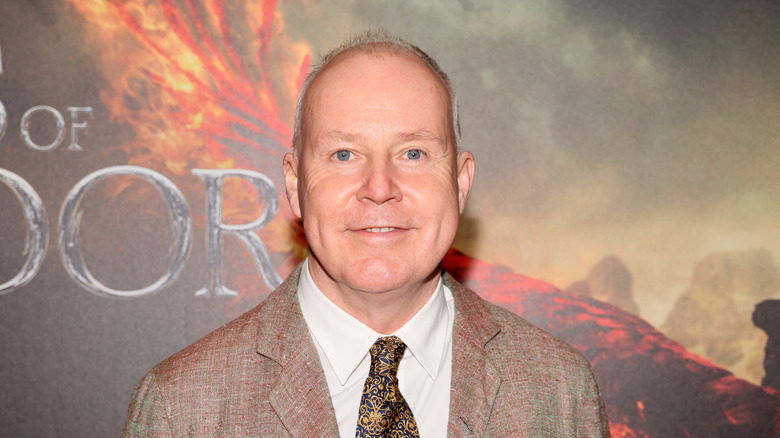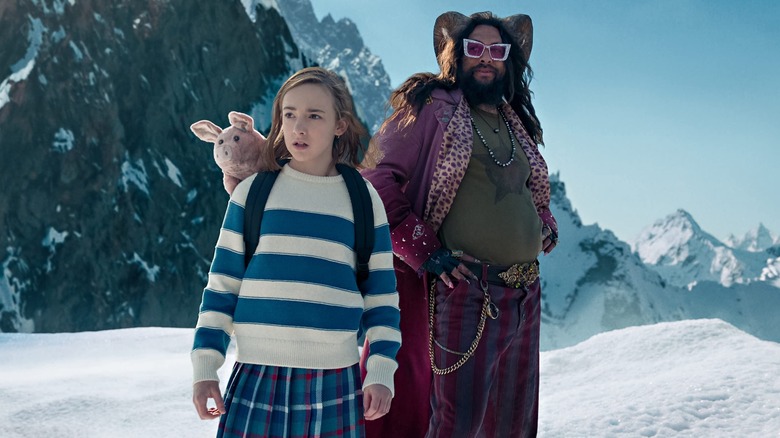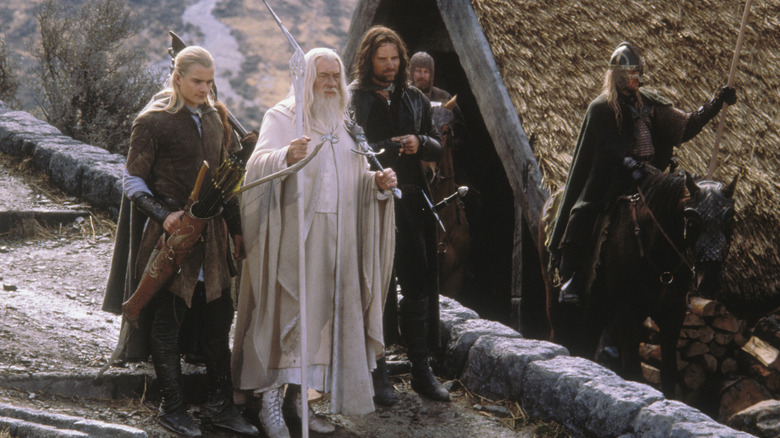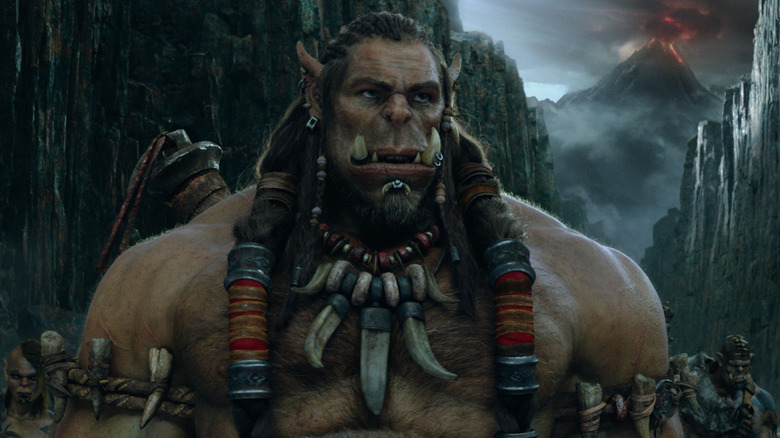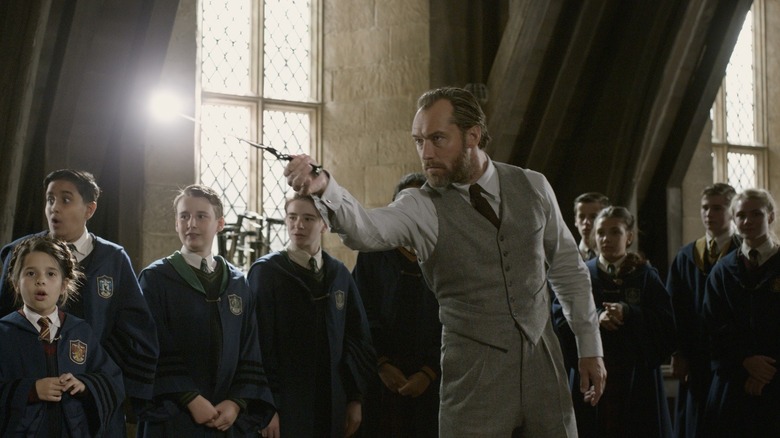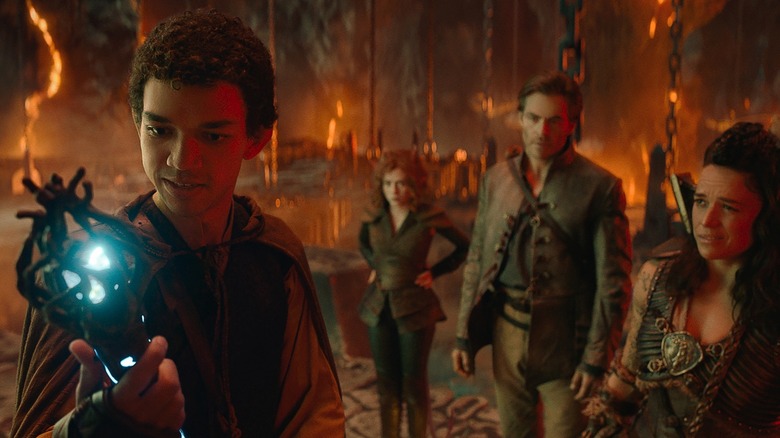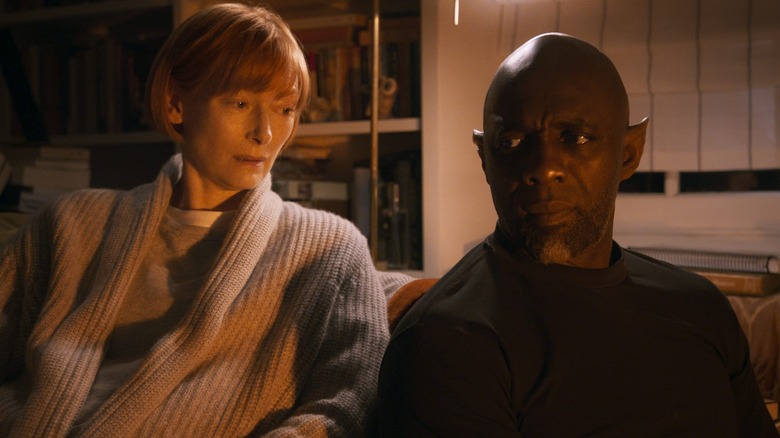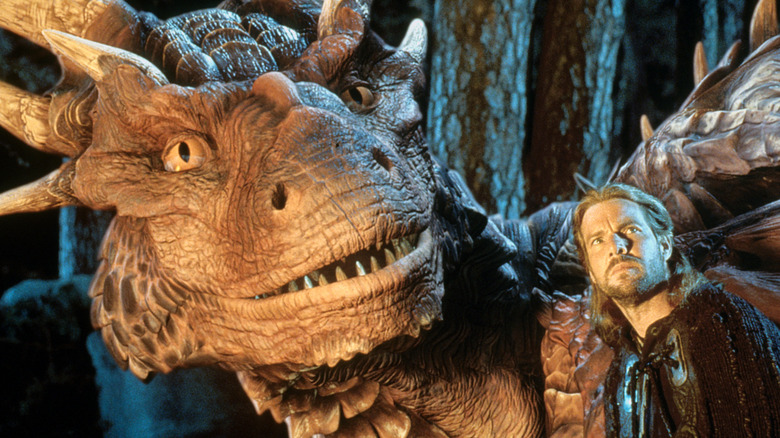Why Fantasy Movies Are In A Box Office Rut
Recently, "Dungeons & Dragons: Honor Among Thieves" debuted to a $37.2 million domestic opening weekend. It was a decent bow that beat out pre-release tracking for the title, but it was still not quite an extraordinary launch for a title that cost over $150 million to make. Considering the widespread raves "Honor Among Thieves" received and the rampant promotional campaign leading to its premiere, it's shocking this fantasy title had a slightly lower opening weekend than something as reviled as "Morbius." But this turn of events is less due to "Honor Among Thieves" failing to entertain any general moviegoers, and more a reflection of what an unshakeable box office rut live-action fantasy movies are in right now.
Unless it's a remake of a classic animated Disney movie, audiences just aren't particularly interested in live-action fantasy movies, with the genre's annual box office hauls in recent years in a steep decline from the peak period of popularity for these movies in the 2000s and early 2010s. There are countless reasons why live-action fantasy movies are currently struggling at the domestic box office, including an influx of competition from streaming services as well as a slew of terrible fantasy titles diluting the genre's appeal to mass audiences. Examining these and several other factors makes it apparent that the live-action fantasy movie is going to require far more than just a potent spell to get out of its box office funk.
There's a deluge of fantasy television
Fantasy television is nothing new. High-concept sitcoms that technically belonged to the fantasy genre have existed for eons, while the 1990s were dominated by popular fantasy programs like "Xena: Warrior Princess." However, in the age of modern streaming shows, fantasy television hasn't just become more prominent, it's also gotten more polished. Productions like "The Lord of the Rings: The Rings of Power" and "House of the Dragons" are incredibly expensive endeavors that aim to deliver cinematic production values in an episodic format. Other recent fantasy projects like "The Wheel of Time" and "Willow" have also not been slouches in delivering lots of movie-level effects within the confines of a single episode. These kinds of shows are so popular that "Dungeons & Dragons: Honor Among Thieves" inspired a TV spin-off before it even hit theaters.
With all these fantasy TV shows dominating the pop culture landscape, there's way less urgency for audiences to watch new fantasy films in theaters. Whereas UPN fantasy programs looked discernibly cheaper than what you would see on the big screen, a 2015 feature like "Pan" now looks way less polished than what you can find on HBO on Sunday night. The ubiquity of fantasy storytelling on television has provided competition that most modern fantasy movies, even well-reviewed ones like "Dungeons & Dragons: Honor Among Thieves," struggle to compete against.
Bad fantasy movies have tainted the genre
No matter how you slice it, the 2010s were not a good era for fantasy movies. While the final "Harry Potter" movie broke box office records and the various live-action remakes of animated Disney movies were hits, there were a lot of fantasy box office duds during this decade. These titles weren't just frustrating misfires, either: They were often all-time famous duds that became industry punchlines. The likes of "Gods of Egypt," "Warcraft," "King Arthur: Legend of the Sword," "The BFG," and so many more all lost tons of money and tainted the fantasy genre. As late as 2018, titles like "Mortal Engines" and "The Nutcracker and the Four Realms" were bleeding cash and giving the fantasy movie a bad name.
Even long-running franchises, once reliable ways of bolstering the fantasy genre, have contributed to the negative public perception of this strain of escapist cinema. The "Fantastic Beasts" movies, most notably, have become reviled by die-hard "Harry Potter" fans and general moviegoers alike. The trio of "Hobbit" movies also proved incredibly divisive, a far cry from the glowing reputation that surrounded the "Lord of the Rings" features in the early 2000s. There's been so much negativity swirling around these projects, not to mention a frequently dismal box office track record, that's caused these films to be associated with the very concept of failure. It's no wonder general moviegoers have begun to give up on fantasy cinema, at least theatrically.
Hollywood's been too focused on prolonging old fantasy brands
The modern live-action fantasy movie is one rooted in the past. Specifically, Hollywood tends to only turn towards fantasy movies when it can exploit a familiar brand. Live-action remakes of old animated titles like "Beauty and the Beast" are the only reason Disney is so in love with fantasy movies starring flesh-and-blood people, for example. Meanwhile, the "Harry Potter" saga attempted to expand its lifespan through a trio of "Fantastic Beasts" movies that didn't garner much audience enthusiasm. This trend doesn't appear to be dying down anytime soon, given that Warner Bros. is now committed to making a whole string of brand-new "Lord of the Rings" movies.
With so many franchise extensions, fantasy movies haven't had an original movie — or even just a non-sequel adaptation — that can belong to a new generation of moviegoers. The courage that informed the decision to green-light the original "Harry Potter" and "Lord of the Rings" movies has vanished from movie studios when it comes to modern fantasy features. As a result, the world of fantasy cinema has become home to a bunch of reheated leftovers. Such projects may please studio executives, but the dwindling domestic box office returns of the "Hobbit" and "Fantastic Beasts" movies suggest that relying only on old brand names isn't a foolproof way to print money, let alone a method of sustaining the long-term lifeblood of the genre.
A lack of visual variety
Live-action fantasy movies can have wildly different visual aesthetics from one another, but mainstream Hollywood studios seem to forget that. Many modern fantasy films have suffered from dim lighting and a consistent lack of vibrant colors. Titles like "King Arthur: Legend of the Sword" coat castles, rivers, and huts in grey hues that make it difficult to distinguish one location from another. Even fantasy projects set in times when electrical lighting has been invented, like the "Fantastic Beasts" trilogy, suffer from an overabundance of poorly-lit cinematography. Meanwhile, the live-action remakes of animated Disney movies have become infamous for how murky their imagery is.
It's hard to pinpoint one reason why fantasy films opt for such samey visual aesthetics and rampantly dark lighting choices, but part of it may be insecurity over how audiences perceive fantasy material at all. There's a perception that mainstream moviegoers think fantasy stuff is too "dorky", so this style of lighting and visuals is an attempt to make these projects seem more "serious" and, by proxy, accessible. Instead, it's just inspired a dreary default aesthetic for the genre that's made it hard to tell any of these movies apart. The 2021 feature "The Green Knight" was packed with vibrant colors and idiosyncratic images, a welcome anomaly in the modern fantasy movie landscape that suggested what so many other entries in this genre are missing.
Mixed track record of updating old fantasy legends
Hollywood's biggest fixation when it came to live-action fantasy movies in the past was delivering new visions of classic fairy tale characters or mythological figures firmly located in the public domain. In the 2010s, though, that approach went sideways for many studios, with projects like "Jack the Giant Slayer" and "Pan" losing tens of millions of dollars for their respective financiers. In the past, familiarity with vintage characters inspired audiences to come to the theater. The umpteenth attempt at making a gritty King Arthur movie, though, just inspired a cold shoulder from moviegoers.
With this style of live-action fantasy movie proving to be an uphill battle to sell to modern audiences, the live-action fantasy movie has incurred an increasingly erratic track record. Even projects anchored by massive movie stars like Dwayne Johnson's 2014 "Hercules" have demonstrated that moviegoers aren't stoked about watching more rehashes of familiar fantasy characters. Even Disney hasn't been able to turn all vintage fantasy characters into modern live-action blockbusters, as seen by "The Nutcracker and the Four Realms." The 2010s weren't a peak era for live-action fantasy movies at the box office, but they were especially rough for titles based on legendary figures that already scored countless previous film adaptations.
Fantasy auteurs have either moved on or vanished
The world of live-action fantasy movies in the 21st century has been heavily dependent on a handful of directors. For instance, once David Yates began helming "Harry Potter" titles with "Harry Potter and the Order of the Phoenix" in 2007, he's been the only director involved in that franchise. Meanwhile, Peter Jackson was the sole filmmaker behind the "Lord of the Rings" trilogy and the subsequent "Hobbit" trilogy. Even Andrew Adamson, a director who once skewered fairy tales with the initial "Shrek" installments, became an auteur of live-action fantasy features with the first two "Chronicles of Narnia" movies. Meanwhile, director Chris Columbus shifted between helming the first two "Harry Potter" films before leaping over to direct the inaugural "Percy Jackson" installment.
While the reliance on a small cluster of filmmakers did ensure studio executives could sleep easy knowing these live-action fantasy features were in experienced hands, it didn't create a wide pool of filmmaking talent to take over once these veterans moved on. With Jackson now knee-deep in documentaries and even Yates shifting away from "Fantastic Beasts," there's a dearth of experienced fantasy directors to handle new entries in the genre. This drought of directorial talent has caused a severe dwindling in the basic presence of live-action fantasy features, which is only exacerbating problems related to box office performance.
Fantasy movies have gone to streaming
Like R-rated comedies and romantic comedies, live-action fantasy movies are a genre that has largely migrated over to streaming in the modern world. In 2022 alone, Netflix dropped "The School for Good and Evil" and "Slumberland," both projects that hark back to movies that opened in theaters just a decade earlier. Meanwhile, Disney has used its Disney+ platform to drop live-action fantasy titles like "Godmothered" and "Disenchanted," the latter of which was a big-budget musical sequel to a big-screen hit. That's the kind of follow-up that would normally be a no-brainer for a splashy theatrical release, but was instead relegated to streaming.
With the poor box office track record of fantasy movies in the late 2010s, producers and studio heads alike have both opted to direct most fantasy features to streaming launches. In the process, they have created a weird cycle where there are few fantasy movies in theaters to prove the genre is still viable theatrically ... because they're innately perceived to be ill-suited for the big screen. This approach has also coded fantasy movies in the minds of audiences as something that's only "good enough" for Netflix rather than worth shelling out big bucks to see on the big screen. It isn't just fantasy TV shows on streaming services that have diluted fantasy cinema: Entries in the genre that have gone to Disney+ and Netflix are also impacting this cinematic space.
The shadow of old fantasy movies is hard to avoid
The lasting legacy of mega-hits like "Lord of the Rings" and "Harry Potter" on the world of live-action fantasy movies is a mixed blessing. On the one hand, these projects proved that the fantasy genre was just as capable as any other of attracting mainstream audiences and shattering box office records. But on the other hand, those same movies have cast such a wide shadow over any future fantasy movies that it's been hard for subsequent features to establish their own identities. Everybody's drawing from their visual aesthetics and approaches to fantasy lore, among other elements, and that's ensured a lack of variety. This problem even extends to spin-offs within those massive sagas, with titles like "Fantastic Beasts and Where to Find Them" feeling like knock-offs rather than projects as fresh as the original "Potter" films.
Audiences have also proven wary of signing up to watch any new live-action fantasy movie simply because of the sky-high expectations set by "Lord of the Rings" and "Harry Potter." If the latest film doesn't have a moment as momentous as "But I can carry you!" from "Return of the King," it can feel like a disappointment. While "Lord of the Rings" and "Harry Potter" ensured the very existence of live-action fantasy cinema in the 21st century, these franchises also doomed new titles with an overwhelming creative legacy.
Fantasy movies have been leaning towards darker tones
The biggest live-action fantasy movies of the 2000s were those that kids and teenagers could enjoy. These obviously aren't the only kind of fantasy stories you can tell, but they are the sort of narratives that scored the biggest box office hauls at the start of the 21st century. However, in recent years, fantasy features have grown darker and darker, leaving behind the key adolescent demographic in the process. "The Green Knight," for example, was an R-rated fantasy feature with a heavy emphasis on sex and grim imagery, while the "Fantastic Beasts" movies contained dark references to the Holocaust.
Darker tones for live-action fantasy movies are just fine and dandy when it comes to indie titles like "The Green Knight." But for bigger-budget productions like "King Arthur: Legend of the Sword" and "Warcraft," eschewing tones accessible to younger viewers can alienate a demographic that's often a key supporter of the genre. Plus, it's not like darker blockbusters are guaranteed to lure in older moviegoers. Titles like "Hercules" and "I, Frankenstein" still failed to attract moviegoers of any age, thanks to ad campaigns devoid of any levity or tonal variety. Needless to say, the heavy shift towards bleaker live-action fantasy narratives has adversely impacted this genre's box office potential in countless ways.
Modern literature isn't fixated on fantasy right now
The 2000s boom of live-action fantasy movies was largely predicated on adaptations of modern young-adult fantasy novels. While the massive "Lord of the Rings" trilogy was inspired by classic fantasy literature, the "Harry Potter" and "Twilight" movies garnered much of their popularity from contemporary youth fanbases. Live-action fantasy cinema thrived by leaning on texts that resonated with current teens and had never been adapted to the silver screen before.
In 2022, meanwhile, the world of young-adult novels had shifted towards more grounded stories, like Sabaa Tahir's "All My Rage" or Malinda Lo's "A Scatter of Light." With YA-fantasy literature becoming less popular, there hasn't been as much material or sizeable pre-existing fanbases for Hollywood to mine for new live-action fantasy hits. The shift in literary tastes has inspired a movement away from fantasy in movie theaters and helped to ensure that studios are still fixated on exploiting fantasy sagas that started decades ago, like "Harry Potter" or "Lord of the Rings." With no current generation equivalent to "Twilight" to adapt, the live-action fantasy movie genre has lost a lot of its must-see factor for many younger viewers.
Fantasy is often perceived as being too nerdy for mainstream audiences
Screenings of "Scream VI" were accompanied by a final trailer for fellow Paramount tentpole "Dungeons & Dragons: Honor Among Thieves." This trailer utilized the mold of the long-running Honest Trailers internet series, complete with that production's voice-over narrator, Jon Bailey. Among the many meta-lines delivered by Bailey is a quip about how this movie occupies a separate universe where the "Dungeons & Dragons" tabletop game became "cool." It's a weird bit of shade to throw at a movie's source material (especially since it doesn't match the overall loving vibe of "Honor Among Thieves") but is emblematic of how nervous studios are about the attitude of audiences toward fantasy.
There's a general perception that mainstream moviegoers find fantasy storytelling too "nerdy" to get invested in. This helps explain why so many fantasy reboots in the 21st century, including multiple "King Arthur" movies or other projects like the 2014 "Hercules" film, took on a more grounded approach, stripping away the most outlandish aspects of those mythical universes. This perception likely does exist to some degree among general moviegoers, which helps explain why there's often a ceiling to how lucrative live-action fantasy movies can be. However, diluting the most preposterous elements of these films often deprives these fantasy features of unique qualities that would help them stand out more. It's a strange predicament, exemplifying how tricky it is to pull off modern live-action fantasy titles.
Audiences either want grounded reality or otherworldly adventures, not fantasy stories in between
It's not a hard-and-fast rule, but right now, it looks like audiences want two specific types of escapist adventures. There are projects like "Creed III," and "John Wick: Chapter 4," neither of which are documentaries, but do feature extraordinary characters inhabiting a world that's recognizably a part of modern society. On the other hand, there are also tentpoles like "Avatar: The Way of Water," which take moviegoers to the beautifully-colored planet of Pandora and never even set foot on planet Earth. These two extremes appear quite popular with moviegoers ... but that's also left the fantasy movie in a weird place in terms of attracting audiences.
Fantasy movies can be set in the modern world (see: "Twilight" or "Enchanted"), but many of them are set in ancient time periods in lands that look a lot like planet Earth but aren't quite the world we recognize. This places titles like "Dungeons & Dragons: Honor Among Thieves" in an awkward space between the likes of "Creed III" and "The Way of Water," at least in terms of marketing. These projects seem too detached from our world, but the ancient lands they're rooted in don't seem innately wondrous enough to function as proper escapist material. Going to Pandora and experiencing a whole new world filled with aliens is exciting. Going back to an age before indoor plumbing just isn't as enticing to audiences currently, especially as blockbuster entertainment worth shelling out IMAX ticket prices.
Fantasy films have often had a difficult box office track record
In 1996, the biggest live-action fantasy movie of the year was "Dragonheart," which made a respectable $51.3 million domestically. While not a flop, that put it behind 29 other motion pictures released in North America that same year, including titles like "Tin Cup" and "Jack" that didn't have such lavish budgets. Two years later, the biggest live-action fantasy title of the year was "Practical Magic" with $46.8 million. The genre just wasn't attracting lots of people even back in the late 1990s, which made the astonishing success of early 2000s projects like "The Fellowship of the Ring" all the more remarkable.
The live-action fantasy movie has often had a difficult time at the box office, with major successes the exception rather than the rule. In general, live-action fantasy has a mixed track record financially — it seems like it's always a little harder to get moviegoers onboard with knights and horses compared to aliens and spaceships. If there's any consolation for fans of these movies, though, it's that hits like "Lord of the Rings" do ensure Hollywood will never fully give up on the genre. There'll always be artists and executives around trying to buck the box office difficulties of live-action fantasy movies and deliver something truly magical to moviegoers.
